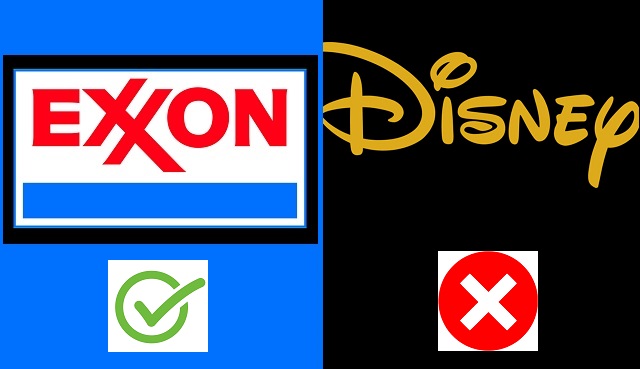BOOM: Exxon Prohibits LGBTQ, BLM Flags Outside Corporate Offices

The proof is the pudding or in this case, the numbers.
Disney went woke
Exxon Mobil banned woke #GoWokeGoBroke pic.twitter.com/SIspmKfGJS
— John 1776 Cardillo (@johncardillo) April 23, 2022
Report: Exxon Prohibits LGBTQ, BLM Flags Outside Corporate Offices
By Breitbart News, April 23, 222:
Exxon Mobil Corp. does not intend to fly an LGBTQ flag in front of corporate offices in June during pride month, according to a report.
Bloomberg News reports having seen a new Exxon company policy that prohibits “external position flags,” including the LGBTQ and Black Lives Matters flags, from being flown in front of corporate offices. “Instead, the rule permits a flag representing an LGBTQ employees’ group that does not prominently feature Exxon’s corporate logo,” according to the outlet.
The move has sparked outrage among the company’s PRIDE Houston Chapter, as members of the group are now declining to represent the company in the city’s June pride celebration, according to Bloomberg.
“Corporate leadership took exception to a rainbow flag being flown at our facilities” last year, stated employees in the group in an email. “PRIDE was informed the justification was centered on the need for the corporation to maintain ‘neutrality.’”
Exxon Vice President of Human Resources Tracey Gunnlaugsson provided Bloomberg News with a statement on the matter, which reads in part:
The updated flag protocol is intended to clarify the use of the ExxonMobil branded company flag and not intended to diminish our commitment to diversity and support for employee resource groups. We’re committed to keeping an open, honest, and inclusive workplace for all of our employees, and we’re saddened that any employee would think otherwise.
Of the company’s roughly 63,000 employees around the globe, 3,000 are part of Exxon’s pride employee resource group, according to Bloomberg News.
RELATED ARTICLE: Disney Has Lost $50 Billion In Value Since Woke War With Florida
EDITORS NOTE: This Geller Report column is republished with permission. ©All rights reserved.
Quick note: We cannot do this without your support. Fact. Our work is made possible by you and only you. We receive no grants, government handouts, or major funding.
Tech giants are shutting us down. You know this. Twitter, LinkedIn, Google Adsense, Pinterest permanently banned us. Facebook, Google search et al have shadow-banned, suspended and deleted us from your news feeds. They are disappearing us. But we are here.Subscribe to Geller Report newsletter here— it’s free and it’s essential NOW when informed decision making and opinion is essential to America’s survival. Share our posts on your social channels and with your email contacts. Fight the great fight.
Follow Pamela Geller on Gettr. I am there. click here.
Follow Pamela Geller on Trump’s social media platform, Truth Social. It’s open and free.
Remember, YOU make the work possible. If you can, please contribute to Geller Report.


